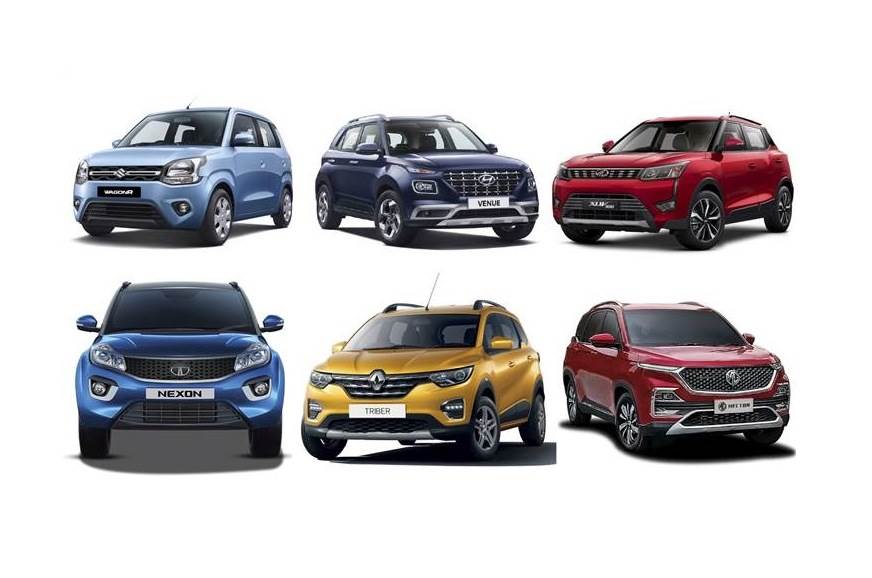
The year 2019 is over and out, and the following is what the last month of the year had to show in terms of sales, as passenger vehicle (PV) manufacturers rejigged production schedules and inventory levels to get ahead of the BS6 mandate from April 2020. Manufacturers in India report despatches to dealers as sales numbers. An analysis of 10 carmakers’ sales in December 2019 reveals overall sales are down by 2.95 percent.
PV market leader Maruti Suzuki India reported marginally improved numbers for December 2019. With total sales / despatches of 1,22,784 units, the manufacturer recorded 2.5 percent YoY growth (December 2018: 1,19,804). The company had last recorded growth in October 2019, which came after seven straight months of decline, but was down again 3.3 percent in November.
The entry-level hatchback segment (Alto, S-Presso and old Wagon R) saw despatches of 23,883 units, down 13.6 percent (December 2018: 27,649). The six-member compact car lot – new Wagon R, Celerio, Ignis, Swift, Baleno and Dzire – which was down 7.6 percent in November, has bounced back and how. At 65,673 units, this lot saved Maruti the blushes with robust 27.8 percent YoY growth (December 2018: 51,346). The premium Ciaz sedan continues to bear the brunt of the slowdown. At 1,786 units last month, its numbers are a massive 62 percent down on earlier-ago sales (December 2018: 4,734). Clearly, Maruti will have to do a strategic rethink on the marketing game-plan.
Overall, Maruti’s passenger car portfolio, with the boost from the six-member compact cars, totals 91,342 units, up 9.1 percent YoY (December 2018: 83,729). This is also indicative that growth is gradually returning to the passenger car segment.
Maruti Suzuki, like other manufacturers, is benefiting from the wave of demand for UVs. In December, it despatched 23,808 UVs, which is a 17.7 percent growth (December 2018: 20,225) and 604 units more than the 23,204 units sold in November. The two vans, Eeco and Omni, are faring poorly. At 7,634 units, sales are down a substantial 51.8 percent (December 2018: 15,850).
Maruti Suzuki also sold a total of 1,360 units of the rebadged Baleno, sold as the Toyota Glanza to Toyota Kirloskar Motor, taking total Glanza deliveries over the nine-month period to 17,950 units.
Hyundai Motor India, which recently revealed its new compact sedan, the Aura, despatched a total of 37,953 units last month, down 9.8 percent (December 2018: 42,093). The Korean carmaker announced cumulative sales of 6,91,460 units (-2.6 percent), comprising 5,10,260 units in the domestic market (-7.2 percent) and 1,81,200 units in exports (13.2 percent) in CY2019. This constitutes a decline of 2.6 percent year on year (CY2018: 7,10,012). The decline would have been a tad more if it weren’t for the sterling performance of its overseas shipments, which account for 26.20 percent of the Chennai-based carmaker’s cumulative sales in 2019. From this, it can be seen that the strong export performance has helped buffer the downturn in the domestic market numbers, albeit Hyundai, like other passenger vehicle manufacturers, continues to feel the pressure of the poor consumer sentiment and a slowed-down economy.
Mahindra & Mahindra (M&M) sold a total of 15,691 PVs, including UVs (utility vehicles), cars and vans, a growth of 4 percent (December 2018: 15,091). As always, the Bolero is the bestseller (5,661 units), followed by the Scorpio (3,656), XUV300 (2,132), XUV500 (1,399), TUV300 (884). The Alturas G4 sold 123 units in December 2019, taking its cumulative 13-month total to 2,182 units or an average of 167 units since launch in December 2018. Meanwhile, the Marazzo MPV saw despatches of 1,292 units, taking its cumulative total to 34,297 units over 17 months since launch in August 2018. The Thar sold just two units last month.
Tata Motors has reported total despatches of 12,785 units for December 2019, down 10 percent (December 2018: 14,260). The Tiago hatchback is Tata Motors’ bestseller, with 4,558 units (4,137 petrol and 421 diesel), followed by the Nexon SUV with 4,530 units (2,909 petrol and 1,441 diesel). Since launch 28 months ago, the Nexon has sold a total of 1,15,893 units comprising 58,719 petrol and 57,174 diesel variants.
Other sales include the Tigor sedan (1,487), Harrier SUV (1,458), Zest sedan (520), Hexa crossover (317), Safari Storme (63), and Bolt (32).
Mayank Pareek, president, passenger vehicles business unit, Tata Motors, said, “Our focus in December has been to drive retail and minimise the network stock in order to facilitate a smooth transition to BS6. Our marketing campaigns and attractive consumer schemes resulted in the highest retail sales this fiscal. December retail was 83 percent higher than the offtake and the dealer network stock has been reduced to lowest-ever level. Having almost completed our planned production and despatches of BS4, we will start moving to BS6 production and despatches from January and step up our volumes in the coming months.
Honda Cars India recorded sales of 8,412 units, down 36 percent (December 2018: 13,139). Commenting on the sales, Rajesh Goel, senior vice-president and director, sales and marketing, Honda Cars India said, “Our volumes in December 2019 have been on expected lines. In order to avoid any leftover BS4 stocks, we channelised our resources more towards liquidating them. Our BS4 despatches are finished now so that our dealers can smoothly transition into BS6 regime in the coming months.”
Toyota Kirloskar Motor sold a total of 6,544 units to its dealers (wholesales) in the domestic market in December 2019, a decline of 44.71 percent YoY (December 2018: 11,836). Naveen Soni, senior vice-president, sales and service, Toyota Kirloskar Motor said, “We are consciously lowering the volumes sold to dealers to ensure a smooth transition to BS6 by April 2020 and ensure that there is no pending BS4 inventory at dealerships by March 30, 2020, which will be unsaleable after the transition. We are well prepared for the BS6 transition.”
Renault India, as a result of the growing demand for its recently launched Triber, clocked sales of 11,964 units, up 95 percent YoY (December 2018: 6,134). The Triber sold a total of 5,631 units, taking its five-month total of 24,142 units or a monthly average of 4,828 units. Other sellers were the Kwid (5,539), Duster (756) and the Lodgy (37). Only one Captur SUV was sold.
Ford India sold a total of 3,021 units in December 2019, down 52 percent YoY (December 2018: 6,375). The bestseller for the American carmaker is the EcoSport (1,727). All other models sold in three digits: New Figo (490), Freestyle (296), Endeavour (261) and Aspire (247). There was no buyer for the Mustang sportscar last month.
MG Motor India has reported despatches of 3,021 units of the Hector in December 2019. Since July 2019, the carmaker recorded total sales of 15,930 units. Its second vehicle in India – the MG ZS EV, India’s first pure-electric internet SUV – will go on sale in January 2020.
MG Motor India currently has over 150 dealer centres across India and aims to expand its network count to 250 centres by March 2020.
Nissan Motor India registered sales of 2,169 units in December 2019, down 11 percent (December 2018: 2,448). While the Datsun brand sold a total of 1,552 units, comprising 1,380 Redigos, 105 Go hatchbacks and 67 Go+ MPVs, Nissan’s bestseller was the Kicks SUV, with 501 units, followed by 65 Micra hatchbacks and 51 Sunny sedans.
With the BS6 mandate less than three months away, the coming weeks will see carmakers actively reduce their BS4 stock and start producing BS6-compliant PVs. Some upcoming new product launches and the Auto Expo 2020 in early February will spice up things but whether consumer sentiment and the economy improve remains debatable.
[“source=autocarindia”]





